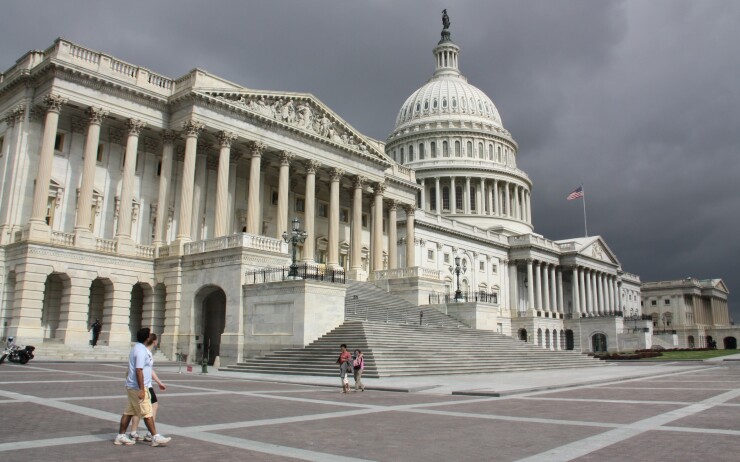Moody’s Investors Service revised its rating outlook for the Aaa-rated District of Columbia to negative Monday, matching its Friday action on the United States government.
At the same time, the rating agency affirmed the Aaa issuer ratings and stable outlooks of Florida, Maryland and Virginia.
The actions follow Friday’s outlook revision on the United States to negative from stable by Moody’s while it affirmed the U.S. sovereign rating at Aaa.
Adobe Stock
Moody’s said the main reason for the negative outlook on the United States was its assessment that “the downside risks to the U.S.’ fiscal strength have increased and may no longer be fully offset by the sovereign’s unique credit strengths.
“In the context of higher interest rates, without effective fiscal policy measures to reduce government spending or increase revenues, Moody’s expects that the U.S.’ fiscal deficits will remain very large, significantly weakening debt affordability,” the rating agency said. “Continued political polarization within U.S. Congress raises the risk that successive governments will not be able to reach consensus on a fiscal plan to slow the decline in debt affordability.”
In August, Fitch Ratings downgraded the U.S. long-term sovereign issuer default rating to AA-plus from AAA and revised the outlook to stable from negative.
S&P Global Ratings assigns an AA-plus rating with stable outlook to the United States. S&P cuts its rating on the U.S. from AAA in 2011, citing political infighting over the debt limit, something that is coming up again in the weeks ahead.
In March, Kroll Bond Rating Agency affirmed its AAA rating and stable outlook on the U.S., based “on our expectations for the continued primacy of the U.S. dollar as the key global reserve currency and the abundant access to liquidity.” However, KBRA said “repeated debt ceiling brinkmanship is not constructive.”
Moody’s said the new negative outlooks on D.C. and the related Washington Convention & Sports Authority reflect “the District’s economic, financial, capital market and governance linkages to the federal government. If the U.S. government rating were downgraded, D.C. and WCSA ratings would also likely move because of the District’s sensitivity to federal spending cuts, dependence on federal transfers and exposure to capital markets disruption.”
Moody’s said Monday its affirmations of Aaa Virginia, Florida and Virginia and continued stable outlooks “indicate that their credit profiles likely would withstand a one-notch U.S. rating downgrade, despite federal government linkages more substantial than those of other Aaa-rated states.”
Moody’s chose these three states to focus on because they could be the most affected by any downgrade of the U.S. sovereign.
The rating agency said that both Maryland and Virginia are close to the nation’s capital and see more federal-government-derived GDP and employment than other states.
Florida depends on federal disaster relief when storms hit, Moody’s noted, a growing challenge as climate change increases the frequency and severity of hurricanes and tropical storms.
“Deterioration in the U.S. sovereign credit consistent with a one-notch downgrade is unlikely to cause reductions in either federal employment or disaster relief capacity sufficient to undermine the states’ credit,” Moody’s said.
The rating agency said these three states also benefit from having “stronger fundamental credit profiles than the sovereign, including ample liquidity and much lower leverage, especially when federal liabilities for Social Security and Medicare are factored in.”
Moody’s said the states have revenue-raising authority that is independent from the federal government and generally have more stable revenue bases.
“Given the amortizing nature of their debt and their limited exposure to variable interest rates, the states are also less vulnerable to rising interest rates and financial market disruptions. Their reliance on payments received directly from the federal government in the normal course of operations is low,” Moody’s said.
Florida, Maryland and Virginia are rated AAA by S&P and Fitch and the District of Columbia is rated AA-plus by both agencies.
Additionally on Monday, Moody’s revised the outlook on the Smithsonian Institution to negative from stable while affirming the Aaa and Aaa/VMIG1 ratings on the institution’s revenue bonds.
“The negative outlook reflects the Smithsonian’s ties to and dependency on the Government of the United States of America for operating and capital funding,” Moody’s said. “In the absence of evidence of increased independence from federal funding the rating could be downgraded if the credit of the U.S. government is downgraded.”
